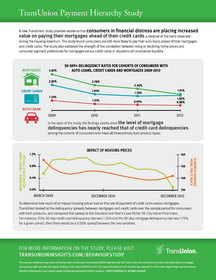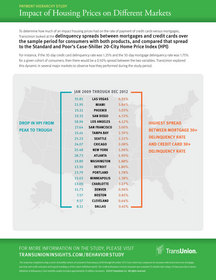CHICAGO, IL--(Marketwired - Sep 19, 2013) - A new TransUnion study provides evidence that consumers in financial distress are placing increased value on paying their mortgages ahead of their credit cards, a reversal of the trend observed during the housing downturn. The study found consumers are still more likely to pay their auto loans ahead of their mortgages and credit cards.
The study also validated the strength of the correlation between rising or declining home prices and consumer payment preferences between mortgages and credit cards in situations of constrained liquidity.
"The results of previous TransUnion research showed that, beginning in 2008, consumers with both a credit card and a mortgage had a higher propensity to go delinquent on their mortgages than on their credit cards -- a reversal of traditional payment patterns," said Steve Chaouki, co-author of the study and group vice president in TransUnion's financial services business unit. "This occurred in an economic environment marked by the build-up and bursting of the housing bubble. In fact, it is broadly believed that the shift in payment preferences was largely derived from the struggles of the housing market. Our latest study indicates that, for the first time since the housing bubble, consumers with constrained liquidity are making their mortgage payments about as much as their credit card payments, though auto loan payments remain the top priority."
The TransUnion study captured the responsiveness of payment behavior to both periods of significant home price depreciation as well as periods of significant appreciation, with a sample window spanning from January 2008 to December 2012. The delinquency measures were based on 12-month rolling consumer cohorts. For example, the first cohort included all consumers in the sample who had a mortgage, credit card and auto loan all in good standing as of January 2008, and then measured the presence of a 30 days past due or worse delinquency as of January 2009.
In the span of the study, the findings clearly show the level of mortgage delinquencies have nearly reached that of credit card delinquency among the cohorts of consumers who have all three primary loan product types.
| 30-Day Delinquency Rates for Cohorts of Consumers with Auto Loans, Credit Card and Mortgages 2009-2012 |
||||||||
| 2009 | 2010 | 2011 | 2012 | |||||
| Auto Loans | 1.34% | 1.01% | 0.93% | 0.88% | ||||
| Credit Cards | 2.82% | 1.94% | 1.76% | 1.82% | ||||
| Mortgages | 3.83% | 2.78% | 2.46% | 1.91% | ||||
"With continued improvements in housing prices, it's probable that by the end of 2013 we will see the majority of consumers paying their mortgages ahead of their credit cards," added Chaouki.
To determine how much of an impact housing prices had on the rate of payment of credit cards versus mortgages, TransUnion looked at the delinquency spreads between mortgages and credit cards over the sample period for consumers with both products, and compared that spread to the Standard and Poor's Case-Shiller 20-city Home Price Index. For instance, if the 30-day credit card delinquency rate was 1.25% and the 30-day mortgage delinquency rate was 1.75% for a given year, then there would be a 0.50% spread between the two variables.
"Looking at the delinquency spread in comparison to housing prices, we observed an interesting pattern with three phases: rapid increase, stabilization, and rapid decrease," said Ezra Becker, co-author of the study and vice president research and consulting at TransUnion. "These three phases of delinquency behavior appear to be primarily driven by the evolution of home prices."
The study found variances for the major markets impacted by the housing bubble. For instance, Los Angeles, Chicago and Dallas experienced the housing crisis quite differently. These differences in the trend of home prices resulted in distinct payment hierarchy experiences across the three geographies. While the delinquency spread between mortgage and credit cards for the United States peaked at just over 1%, markets hit hard by the mortgage crisis had much higher spreads.
In the case of Los Angeles, which experienced significant home value depreciation followed by a period of stable prices and a recent period of home price appreciation, the delinquency spread between mortgages and credit cards peaked early on at above 4%. However, the spread declined continuously until reaching near-parity levels by the end of the sample period.
Chicago also experienced a significant home value correction, but in contrast to Los Angeles Chicago experienced sustained price decreases and no significant rebound in the recent period. Chicago's delinquency spread peaked at 2% a year later than Los Angeles and hovered between 1% and 2% through the end of the period.
Dallas, mostly insulated from the housing crisis, had stable price conditions throughout the sample period. As a result, its delinquency spread experienced little change over the sample period, starting and ending below zero and moving within a narrow band.
"These market examples provide a glimpse into regional dynamics and help explain how the mortgage crisis impacted consumer payment patterns," said Becker.
For more information on the TransUnion study, please visit: http://www.transunioninsights.com/behaviorstudy.
About the Study
The study was completed using a series of monthly cohorts of consumers from January 2008 through December 2011. Each cohort was composed of consumers who had at least one mortgage, auto loan and credit card open and in good standing as of the cohort definition month. The credit performance of each consumer was evaluated 12 months later using a 30 days past due or worse definition of delinquency. Each monthly sample included approximately 20 million
consumers.
About TransUnion
As a global leader in credit and information management, TransUnion creates advantages for millions of people around the world by gathering, analyzing and delivering information. For businesses, TransUnion helps improve efficiency, manage risk, reduce costs and increase revenue by delivering comprehensive data and advanced analytics and decisioning. For consumers, TransUnion provides the tools, resources and education to help manage their credit health and achieve their financial goals. Through these and other efforts, TransUnion is working to build stronger economies worldwide. Founded in 1968 and headquartered in Chicago, TransUnion reaches businesses and consumers in 33 countries around the world on five continents. www.transunion.com/business
Contact Information:
Contact
Dave Blumberg
TransUnion
E-mail
Telephone 312 972 6646

